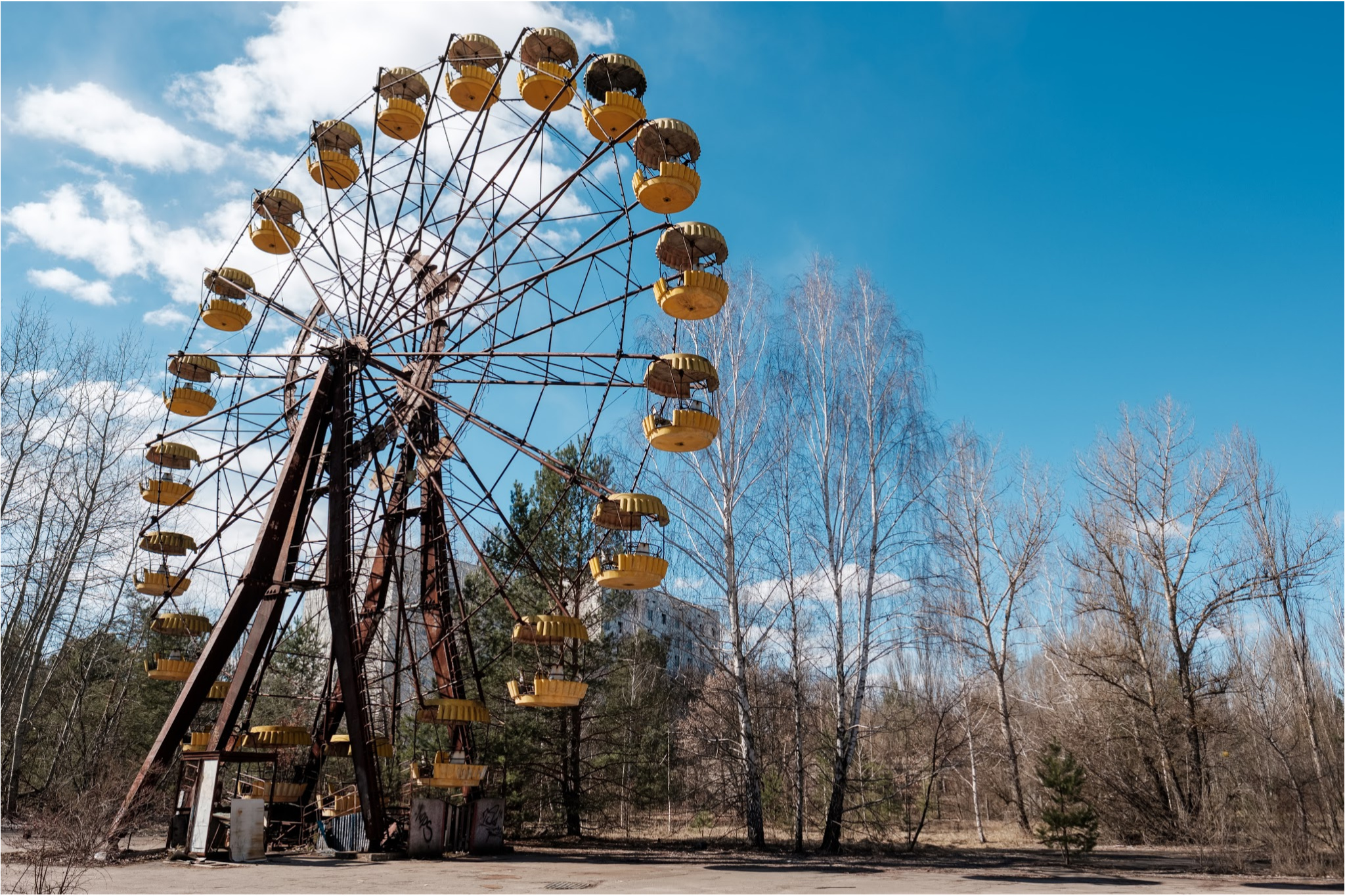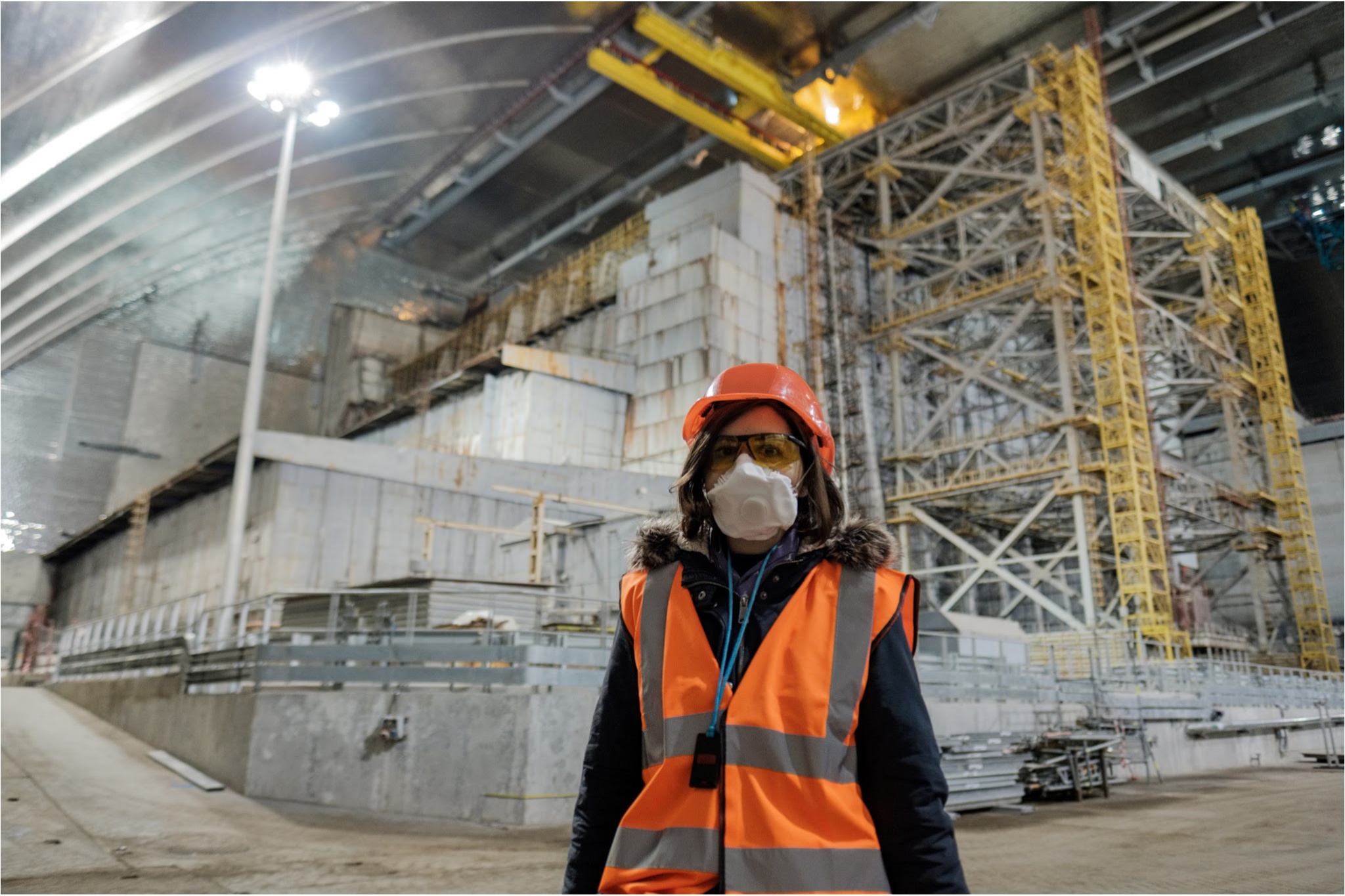By Rachel Bauman, Policy Advisor
and Kyle Parker, Senior Senate Staff Representative
Disaster
In the early morning hours of April 26, 1986, during a safety test designed to simulate a power outage, a combination of operator error and inherent flaws in reactor design led to an explosion and fire at Chernobyl Nuclear Power Station’s Reactor 4. The graphite fire burned uncontained for nine days, releasing radioactive particles over most of Europe, contaminating Ukraine and neighboring Belarus most severely.
It took nearly two full days for Soviet authorities to begin the evacuation of the approximately 50,000 residents of the nearby city of Pripyat, located just a mile away from the power station. A public admission of the accident only came on the evening of April 28 following diplomatic pressure on the Kremlin from the government of Sweden where, earlier that day, monitors at the Forsmark Nuclear Power Plant north of Stockholm had detected elevated radiation levels and suspected an accident in the Soviet Union. Given the secrecy of the Soviet system, the subjectivity of first-hand accounts, and the breakup of the Soviet Union, some of the why and how of what happened remain controversial.

This amusement park in Pripyat was scheduled to open on May 1, 1986, a few days before the disaster.
Less than six months after the disaster, construction began on nearby Slavutych, a city to replace Pripyat and house the displaced workers from the Chernobyl Nuclear Power Station and their families. Much work remained to be done to contain and assess the April disaster, not to mention run the remaining three reactors, the last of which ceased to operate only in December 2000. The formal decommissioning process of Reactors 1, 2, and 3 began in 2015 and will continue for decades.
To this day, many residents of Slavutych board a special train for the power station’s workers transiting Belarus to enter the Exclusion Zone for work at the plant and nearby storage facilities for spent nuclear fuel.
Consequences
Thirty-three years after that safety test at Reactor 4 went fatally wrong, the nuclear disaster at the Chernobyl Nuclear Power Station remains the worst in world history, superseding the 1979 partial meltdown of a reactor at the Three Mile Island Nuclear Generating Station in Pennsylvania and eclipsing the meltdown of three reactors at Japan’s Fukushima Daiichi Nuclear Power Plant following damage sustained by a catastrophic tsunami in 2011. The accident at Three Mile Island remains the worst in the history of U.S. commercial atomic energy and ranked a 5 (accident with wider consequences) on the International Atomic Energy Agency’s scale of assessing nuclear and radiological events. Chernobyl and Fukushima are the only two disasters to ever be ranked as a 7 (major accident), the scale’s maximum.
Due to the differences in the half-lives of the specific contaminants, a full remediation and resettlement around Fukushima holds far greater promise than around Chernobyl. If radioactive leakage can be fully contained at Fukushima, there is a chance that the area could be declared completely safe for permanent human habitation in less than 100 years. By comparison, the first zone of exclusion immediately surrounding Chernobyl’s Reactor 4 is likely to remain unsafe for permanent habitation for thousands of years.
The total human, environmental, and financial cost of the disaster is fraught with obvious political sensitivities, but even in the scientific realm, significant disputes remain. The unprecedented magnitude of the Chernobyl nuclear disaster frustrates efforts to draw a definitive conclusion on the lingering effects of the explosion and fire of 1986. While there is wide agreement that somewhere between 30 and 50 people died in the immediate aftermath as a direct result of the accident, consensus breaks down over estimates of a longer-term assessment of deaths attributable to the radioactive fallout from the disaster.
Shortly after the disaster, a zone of approximately 1,000 square miles around Reactor 4 was established, evacuated, and condemned for permanent human habitation. This area—known as the Exclusion or Alienation Zone—has begun the long process of being reclaimed by nature.
The area is divided between Zone 1 and Zones 2 and 3. The first zone is the immediate vicinity around the Chernobyl Nuclear Power Station and comprises roughly 15 percent of the total Exclusion Zone. It is also contaminated with transuranium elements that decay over a period of thousands of years, placing this area off-limits indefinitely. Zones 2 and 3 comprise the remaining territory and were largely contaminated with elements that decay much faster. Some of this shorter-term contamination is already gone and the rest could be gone in the coming decades.
The Exclusion Zone is as alive as it is hauntingly empty. Forests encroach on what were once fertile fields. Butterflies flutter above concrete cracked open by saplings. Wild horses roam by day and wolves by night, and entropy takes its toll on man-made construction. It almost seems that the flora and fauna suffered more from proximity to humans than they now do from lingering radiation in the contaminated soil—a phenomenon known as the ecological paradox.
Containment
In those first critical hours after the explosion, when firefighters heroically battled a radioactive blaze, efforts were made to erect temporary barriers around the damaged core of Reactor 4. Those emergency efforts continued once the fire was out, but the hasty construction allowed radiation to continue to escape the confines of the reactor and was structurally unsuitable for containing the deadly transuranium elements inside. In 2018, with the support of the international donor community, Ukraine completed construction on the New Safe Confinement facility designed to safely entomb Reactor 4 for as long as 100 years.

Helsinki Commission policy advisor Rachel Bauman inside the structure containing Reactor 4.
Support from the West, most notably the United States, is critical to safety. Currently, Western contractors are working with Ukrainian partners to complete the construction of a long-term storage facility for spent nuclear fuel from other reactors across the country. Construction is reportedly on, or slightly ahead of, schedule on this facility that is planned to eliminate Ukraine’s need to contract with Russia for its growing storage needs.
Protecting the public from the widely dispersed radioactive particulate found within the Exclusion Zone is the main reason for the establishment of the zone itself as well as the multiple checkpoints encountered when leaving the zone. The most immediate danger to further contamination of habitable areas beyond the Exclusion Zone are wildfires; their smoke disperses contaminated debris into the atmosphere and in the direction of prevailing winds. Ukrainian firefighters have trained regularly with firefighters from the American West as they execute what is not only a domestic priority, but an international responsibility.
Other regular challenges to the safe administration of the Exclusion Zone are trespassers pursuing adventure, souvenirs, or wild game. Risks include not only the obvious danger of radiation exposure, but also crumbling construction and poor communications should a rescue be needed. Trespassers also risk the safety of the broader public by inadvertently transporting radioactive materials outside the Exclusion Zone.
A final, and enduring, challenge to securing the Exclusion Zone lies with waning public interest and thus political pressure to devoting scarce financial resources to protect this beautiful but contaminated landscape for the long term.
The Future
Government authorities plan to use Exclusion Zone 1 for dangerous industrial activities such as storing spent nuclear fuel or developing massive solar panel farms designed to replace some of the electricity that was once generated by the power station’s four reactors. The remainder of the Exclusion Zone will serve as a buffer between habitable areas and Zone 1 as well as a unique nature preserve and massive open-air laboratory to study any lingering effects of the disaster.

Construction site of a future spent storage facility.
As the passage of time has made parts of the Exclusion Zone safer, more and more visitors come to learn about those tragic events of the spring of 1986. Locals are beginning to tap a developing market for nuclear tourism, fueled by politicians, scientists, and thrill-seekers.
When leaving the Exclusion Zone and passing through the last checkpoint, travelers are greeted by tour buses, flag-carrying guides, and a roadside kiosk selling cheap t-shirts. Increasing interest in Chernobyl tours, and particularly the photogenic abandoned town of Pripyat, ensure a steady stream of income. The city may no longer generate power, but it continues to generate interest.





